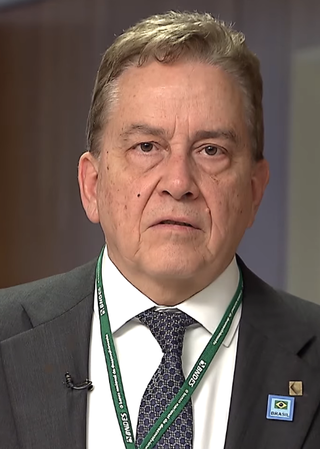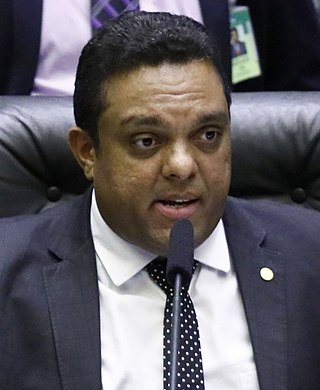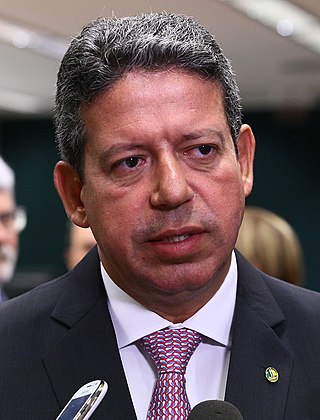The Social Christian Party was a Christian-conservative political party in Brazil.

The Republicans, formerly the Brazilian Republican Party and originally formed as the Municipalist Renewal Party, is a Brazilian political party. Its electoral number, the numerical assignment for Brazilian political parties, is 10.

The Liberal Party is a liberal-conservative political party in Brazil. From its foundation in 2006 until 2019, it was called the Party of the Republic.

General elections were held in Brazil on 7 October 2018 to elect the president, National Congress and state governors. As no candidate in the presidential election received more than 50% of the vote in the first round, a runoff round was held of those offices on 28 October. On that day, right-wing outsider candidate Jair Bolsonaro defeated leftist Fernando Haddad and was elected President of Brazil.

Paulo Rabello de Castro is a Brazilian economist, incumbent president of the Brazilian Development Bank (BNDES). He was also the president of Brazilian Institute of Geography and Statistics (IBGE). For both offices, Rabello was appointed by president Michel Temer.

The Rio de Janeiro gubernatorial election of October 2018 was for the election of the Governor and Vice Governor of Rio de Janeiro and 70 State Deputies. People also voted for 2 of 3 Senators of the state representation in the Federal legislative power, with 45 federal deputies representatives of the Rio de Janeiro State. A second round was held after no candidate managed to secure more than 50% of the Governor votes.

Benevenuto Daciolo Fonseca dos Santos, known as Cabo Daciolo, is a Brazilian military firefighter, pastor and politician affiliated to Republicans. In 2014, he was elected federal deputy. He was expelled from the Socialism and Liberty Party (PSOL) in 2015 and later affiliated to the Labour Party of Brazil, Patriota, Podemos (PODE), Liberal Party and the Brazilian Woman's Party (PMB).

Antônio Hamilton Martins Mourão is a Brazilian politician and retired military officer who served as the 25th vice president of Brazil from 2019 to 2023.

Eduardo Nantes Bolsonaro is a Brazilian politician, lawyer and federal police officer. He is the third child of Jair Bolsonaro, the 38th president of Brazil. Since March 2022 he has been affiliated with the Liberal Party.

Wilson José Witzel is a Brazilian politician and lawyer who was the 63rd Governor of the state of Rio de Janeiro. A member of the Social Christian Party, Witzel is a former federal judge and is an ex-marine. On 28 October 2018, he was elected Governor of the State of Rio de Janeiro with a four-year term beginning in January 2019, replacing Luiz Fernando Pezão, until his impeachment in April 2021.

Marginal at first, news reports and political analysts have pointed the important weight that the Evangelical Christian community has and its impact in electoral politics in Latin America, even helping in the electoral victories of conservative candidates.

Augusto Heleno Ribeiro Pereira is a Brazilian politician retired general of the Brazilian Army. He was military commander of the Amazon and Chief of the Department of Science and Technology of the Army. Heleno has declared positions against official politics, particularly about the attitude of the international community in regards to Haiti and the indigenous politics of the Brazilian government.

Gustavo Bebianno Rocha was a Brazilian lawyer and advisor to President Jair Bolsonaro (PSL). Bebianno became Acting Chairman of the Social Liberal Party in March 2018 after Luciano Bivar registered to run for federal deputy in the 2018 elections.

The 2020 Rio de Janeiro municipal election took place in the city of Rio de Janeiro, Brazil in November 2020 to elect a mayor, a vice mayor, and 51 city councillors for the administration of the city. On the 29 November 2020 run-off election, former mayor Eduardo Paes, of the Democrats (DEM), defeated incumbent mayor Marcelo Crivella of the Republicans (REP), who lost his bid for re-election.

Marco Antônio Feliciano is a Brazilian politician as well as a pastor, writer, film producer, and theologian. He has spent his political career representing São Paulo, having served as federal deputy representative since 2011. A polarizing figure in Brazilian politics due to his outspoken conservative views, his election to president of the commission on human rights and minorities caused controversy and protest due to Feliciano's comments regarding Africans, LGBTQ individuals, women, Catholics, among others.
The Evangelical Parliamentary Front or the Evangelical Caucus is a loosely organized group of Evangelical lawmakers in the Brazilian government and legislature.

Otoni Moura de Paula Júnior is a Brazilian politician and pastor. He has spent his political career representing Rio de Janeiro, having served as federal deputy representative since 2019.

The 2021 President of the Chamber of Deputies of Brazil election took place on 1 February 2021, the day after the opening day of the 3rd Session of the 56th Legislature of the National Congress.

Events in the year 2022 in Brazil.
General elections will be held in Brazil on 4 October 2026 to elect the president, vice president, members of the National Congress, the governors, vice governors, and legislative assemblies of all federative units, and the district council of Fernando de Noronha. If no candidate for president or governor receives a majority of the valid votes in the first round, a runoff election is held on 25 October.

















